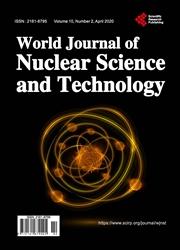Measurement of Natural Radioactivity and Radon Exhalation Rate in Coal Ash Samples from a Thermal Power Plant
引用次数: 18
Abstract
Coal is the main energy source for electricity generation in the world. In Morocco, 37% of electricity generation comes from combustion coal in thermal power plants. This combustion process generates large amounts of fly and bottom ashes. In recent years, these ashes became a great topic of interest because of their different uses and especially in construction materials. In this work, we assess radiation risks due to natural radioactivity in samples of fly and bottom ashes collected from JLEC (Jorf Lasfar Energy Company) thermal power plant, and different analyses are performed through two nuclear techniques such as gamma spectrometry and alpha dosimetry based on the use of LR115 films detectors. Our analysis shows that 226 Ra activities and 232 Th in both ash samples are well above the permissible activity. The values of the external risk index (Hex) and internal one (Hin) for these ashes are below unity, with the exception of 1.28 in fly ash for Hin. The obtained values for the equivalent radium Raeq and annual effective doses Ė in fly and bottom ashes are 324 Bq/kg and 210 Bq/kg, and 0.18 mSv/y and 0.11 mSv/y, respectively. The surface radon exhalation rates for the samples of fly and bottom ashes are 276 mBq • m −2 • h −1 and 381 mBq • m −2 • h −1 , respectively. Based on these results, we have shown that fly ash and bottom one from thermal power plant JLEC didn't have, in any case, a health risk to the public so it can be effectively used in various construction activities.火力发电厂煤灰自然放射性和氡释放率的测定
煤炭是世界上主要的发电能源。在摩洛哥,37%的发电量来自火力发电厂的燃煤发电。这种燃烧过程会产生大量的飞灰和底灰。近年来,这些灰烬因其不同的用途而成为人们感兴趣的一个大话题,特别是在建筑材料中。在这项工作中,我们评估了JLEC (Jorf Lasfar能源公司)火力发电厂收集的飞灰和底灰样本中天然放射性的辐射风险,并通过两种核技术,如基于LR115薄膜探测器的伽马能谱法和α剂量法进行了不同的分析。我们的分析表明,这两个灰样品中的226 Ra和232 Th活性都远高于允许的活性。除粉煤灰的外部风险指数(Hex)和内部风险指数(Hin)为1.28外,其余灰烬的外部风险指数(Hex)和内部风险指数(Hin)均小于1。得到的飞灰和底灰中镭当量Raeq值和年有效剂量Ė分别为324 Bq/kg和210 Bq/kg, 0.18 mSv/y和0.11 mSv/y。飞灰和底灰样品的表面氡析出率分别为276 mBq•m−2•h−1和381 mBq•m−2•h−1。基于这些结果,我们已经证明了JLEC热电厂的飞灰和底灰在任何情况下都不会对公众健康造成风险,因此可以有效地用于各种建筑活动。
本文章由计算机程序翻译,如有差异,请以英文原文为准。
求助全文
约1分钟内获得全文
求助全文

 求助内容:
求助内容: 应助结果提醒方式:
应助结果提醒方式:


